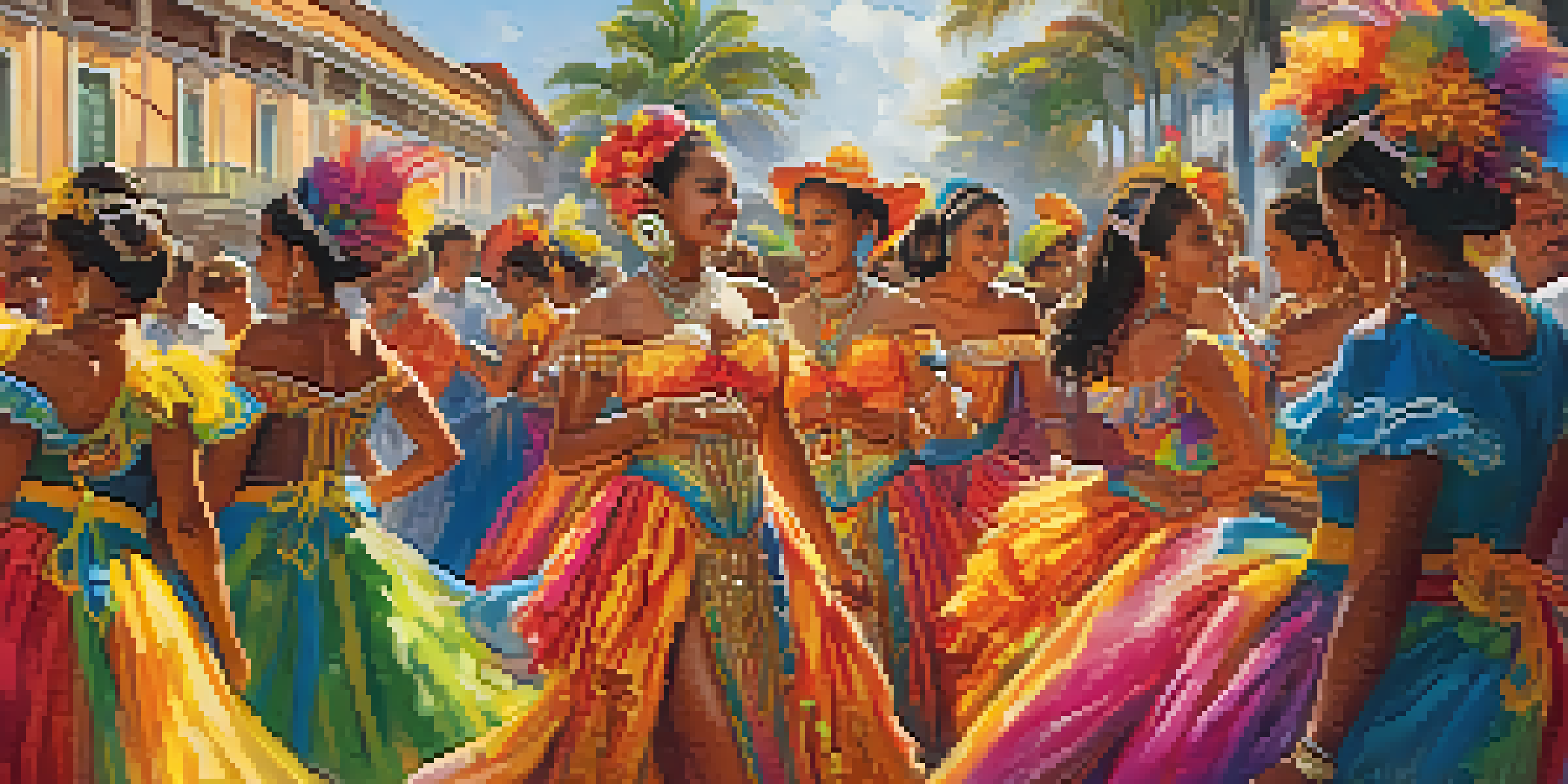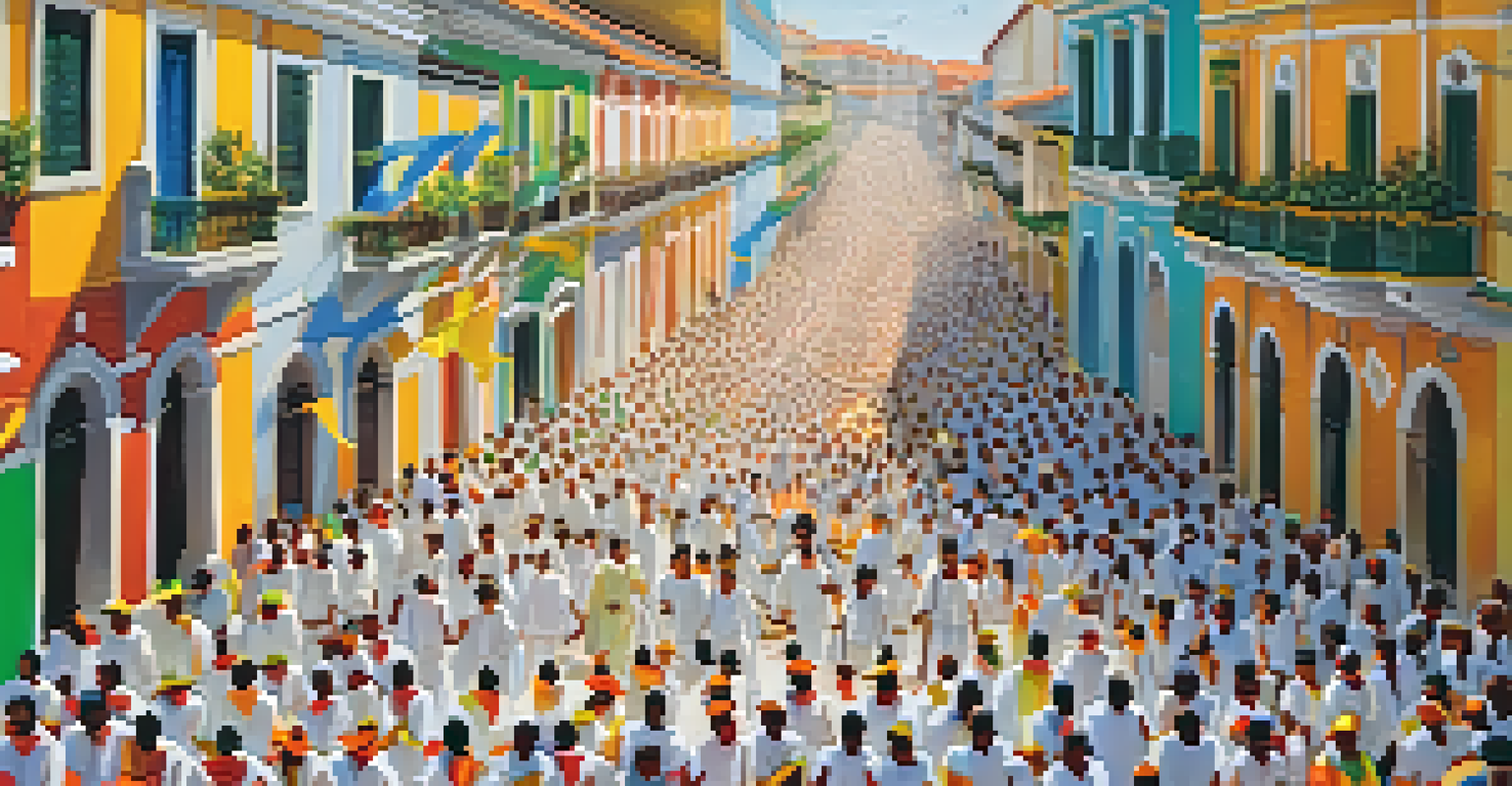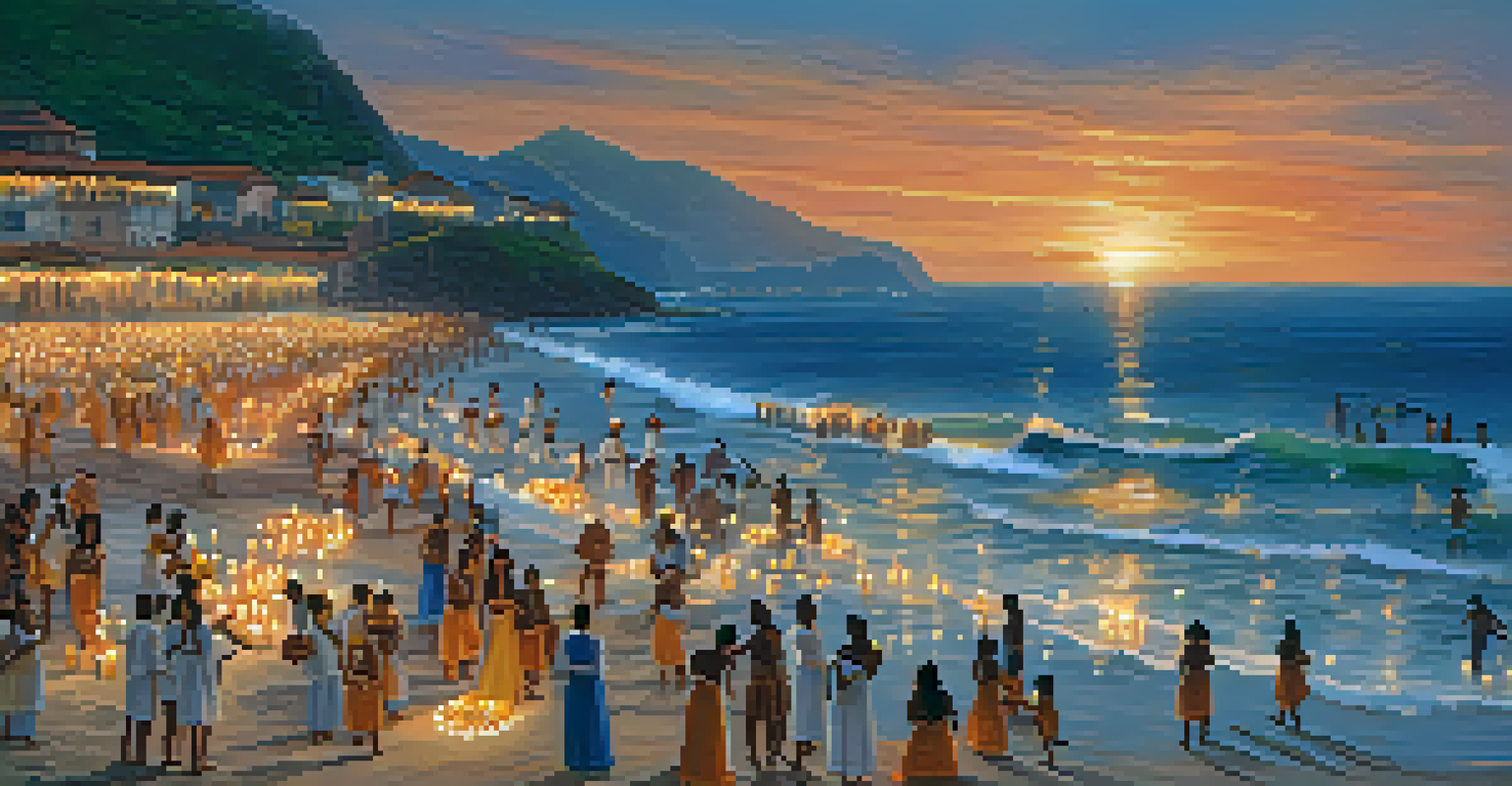Cultural Festivals in Brazil's Historical Towns: A Guide

Understanding the Cultural Significance of Festivals
Cultural festivals in Brazil are more than just celebrations; they are a window into the country's rich history and diverse traditions. Each festival reflects the unique cultural heritage of its respective town, from indigenous roots to colonial influences. These events often showcase music, dance, and art, making them essential for preserving local customs.
Festivals are a time for people to come together, to celebrate their culture and share their identity with others.
For instance, the Festa Junina, celebrated in many towns, is a vibrant homage to rural life and the harvest season, featuring traditional costumes and folk dances. This festival not only entertains but also educates participants about Brazil's agrarian past. Such events create a sense of community, uniting locals and visitors alike in shared experiences.
Through these festivals, towns like Paraty and Ouro Preto invite attendees to immerse themselves in cultural narratives that span generations. This connection to history fosters a deeper appreciation for Brazil's multifaceted identity, making festivals a vital aspect of cultural understanding.
Carnaval: The Crown Jewel of Brazilian Festivals
No discussion of Brazilian cultural festivals would be complete without mentioning Carnaval, a spectacular event celebrated nationwide. However, in historical towns like Salvador and Olinda, Carnaval takes on a unique flavor, blending local traditions with the exuberance that the festival is known for. The streets come alive with vibrant parades, samba music, and colorful costumes that tell stories of the past.

In Olinda, the festival is characterized by giant puppets, called 'bonecos,' which represent various local figures and celebrities. Their playful presence adds a whimsical touch to the festivities, making it a family-friendly event. In Salvador, the Afro-Brazilian influence is prominently showcased through traditional music, dance, and food, creating a rich tapestry of cultural expression.
Festivals Reflect Brazil's Heritage
Cultural festivals in Brazil showcase the country's diverse traditions and rich history, connecting communities through shared celebrations.
Participating in Carnaval is an unforgettable experience that allows visitors to embrace the spirit of Brazil. It’s a time of joy, unity, and celebration, where the past and present collide in a magnificent display of cultural pride.
Festa do Senhor do Bonfim: A Unique Spiritual Celebration
The Festa do Senhor do Bonfim in Salvador is another remarkable cultural festival, steeped in religious significance. Held annually in January, this event draws thousands of pilgrims and tourists to pay homage to the Lord of Bonfim, a figure believed to perform miracles. The procession begins at the Church of Bonfim, where colorful ribbons symbolize wishes and prayers.
Cultural festivals give us a chance to connect with the past while celebrating the present.
As participants walk towards the church, they engage in a vibrant mix of music, dance, and spirituality. The sight of thousands of people wearing white, a symbol of peace and purity, creates a visually stunning atmosphere. Local food stalls and artisans line the streets, offering visitors a taste of Bahia's culinary delights.
Festa do Senhor do Bonfim is not just a festival; it's a heartfelt expression of faith and community. For those who attend, it offers a unique opportunity to connect with the spiritual roots of Brazil and witness the blend of culture and religion that characterizes many Brazilian celebrations.
Festa de Iemanjá: Honoring the Goddess of the Sea
Festa de Iemanjá, celebrated on February 2nd, honors the Afro-Brazilian goddess of the sea, attracting thousands to the beaches of Salvador. This festival beautifully combines spiritual rituals with lively celebrations, as devotees dress in white and offer gifts like flowers and gifts to Iemanjá in hopes of receiving her blessings. The ocean becomes a stage for vibrant ceremonies and heartfelt prayers.
As the sun sets, the atmosphere transforms into a mesmerizing display of lights, music, and dance. Traditional Candomblé rituals take place, showcasing the rich Afro-Brazilian heritage. The festival not only serves as a celebration of faith but also highlights the importance of community and nature in Brazilian culture.
Carnaval: A National Celebration
Carnaval stands out as a vibrant expression of Brazilian culture, blending local traditions with exuberant parades and music.
Attending Festa de Iemanjá is a deeply moving experience that immerses visitors in the beauty of Brazilian spirituality. It’s a chance to witness the harmonious relationship between people and the sea, making it a must-see for anyone exploring Brazil’s cultural landscape.
Oktoberfest: A Brazilian Twist on a German Tradition
While Oktoberfest is originally a German festival, the version held in Blumenau, Brazil, offers a unique cultural fusion. Founded by German immigrants, this festival celebrates its heritage with traditional music, dance, and, of course, plenty of beer. It’s an excellent example of how cultural traditions can adapt and evolve in new environments.
During Oktoberfest, attendees can enjoy a variety of German dishes, from sausages to pretzels, alongside Brazilian favorites. The atmosphere is electric, with music and dance performances that reflect both cultures. Visitors can even participate in traditional German games, creating a festive and inclusive environment.
This festival highlights Brazil's ability to embrace and celebrate its diverse influences. For those keen on experiencing a blend of cultures, Blumenau’s Oktoberfest is a delightful way to dive into this rich culinary and cultural experience.
Festa Nacional da Cultura: Celebrating Brazilian Arts
The Festa Nacional da Cultura, held in various historical towns, is a vibrant celebration of Brazilian arts and culture. This festival showcases everything from music and dance to visual arts and literature, highlighting the extraordinary talent found throughout the country. It aims to promote cultural exchange and appreciation among participants.
During the festival, visitors can attend workshops, art exhibitions, and performances that reflect the diverse cultural landscape of Brazil. Local artists take center stage, offering a platform for emerging talent and fostering community engagement. The festival encourages collaboration and creativity, making it a hub for artistic expression.
Cultural Festivals Foster Community
Participating in Brazil's cultural festivals creates opportunities for connection, understanding, and appreciation of local customs.
Festa Nacional da Cultura serves as a reminder of the importance of the arts in shaping national identity. For anyone passionate about culture, it's an opportunity to immerse themselves in the creativity and innovation that Brazil has to offer.
Cultural Festivals: A Gateway to Local Traditions
Visiting cultural festivals in Brazil's historical towns is an incredible way to experience the nation's rich traditions firsthand. Each festival provides a unique glimpse into local customs, showcasing how communities celebrate their heritage and history. From food to music to dance, these events are sensory feasts that leave lasting impressions.
For example, the Festa de São João is a lively celebration marked by bonfires, traditional dishes, and folk dances that highlight regional culture. Each moment spent at these festivals helps build connections with locals, fostering a deeper understanding of their way of life. Visitors often leave with newfound friendships and cherished memories.

Ultimately, cultural festivals serve as a bridge between the past and the present, connecting people from all walks of life. They invite everyone to celebrate the beauty of diversity and the power of community, making them an essential aspect of Brazil's cultural landscape.